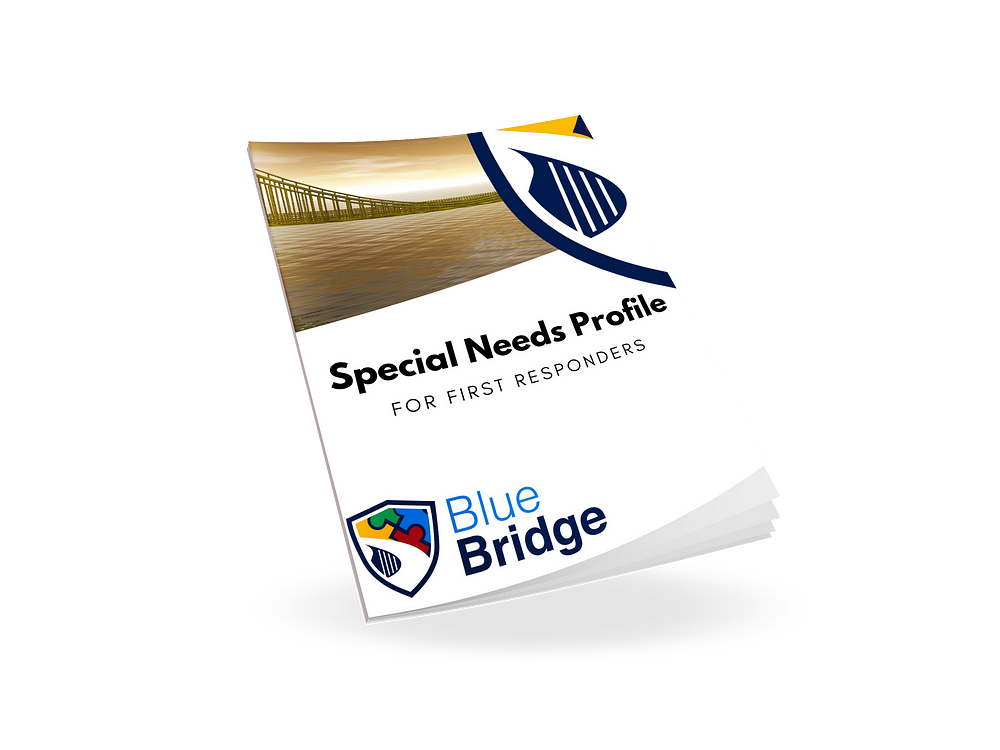Missing: Surviving the Special Needs Parent's Worst Nightmare
Mar 25, 2022It is unthinkable. It is every parent’s worst fear. For a special needs parent or caregiver, the mere thought of it can be crippling. You let your guard down for a moment. You turn your attention away from your loved one for an instant.
He is gone.
As a police officer, I have seen that desperate look in the eyes of a parent many times. As a K9 handler, I have felt the almost unbearable burden of having a family’s entire world resting on my shoulders. As an autism dad, I have also felt the knee-buckling terror of losing my child.
For neurotypical families, the dangers of losing a child start to subside as their children reach the age of 5 or 6 years old. For many special needs parents and caretakers, however, the dangers remain throughout the teenage years and, often, well into adulthood.
The immediate actions taken by the caregiver when a special needs individual goes missing are critical to the success of the subsequent search. Unnecessary delays, inaccurate communication, or emotional paralysis can literally mean the difference between life and death.
In this article, I will offer insights into the process of a missing persons search from the perspective of the police and first responders. I will also offer suggestions to more efficiently communicate with first responders and search personnel to maximize the chances of a successful outcome to our worst nightmare: a missing loved one with special needs.
For the purposes of this article, I will use the most typical scenario: an individual going missing from his own home. Obviously, true to its name, Autism Spectrum Disorder encompasses an array of functional, behavioral, and emotional challenges. I can only speak generally and offer some thoughts that are relevant to the largest possible segment of our community. I freely acknowledge that a lot of this is easier said than done. I have made many of the mistakes that I will mention and I, of all people, should know better. Please understand, I am not here to judge and I do not claim to know it all.
Time is the enemy
It is human nature, once the realization hits you that your loved one is missing, to start looking for him. The emotional process seems to include inherent barriers of acknowledgment that take time to break through.
You first begin searching by yourself. Anywhere between two minutes (an eternity when your loved one is missing) and 10 minutes into your search, you may think to enlist the help of your spouse, other children, and members of your immediate family.
Panic sets in and logical thinking becomes difficult. You check and recheck areas of your home and yard. Your search is random and inefficient. Then your imagination starts to run away.
To be blunt: You are flailing like a swimmer in a riptide. But the swimmer who gains control of his emotions and begins to think rationally is more likely to survive the ordeal.
Keep in mind that it is quite common to locate a missing special needs individual inside their home. Often they crawl into or under a bed, into a closet or behind furniture. They may be embarrassed, spiteful, or scared. Sometimes they fall asleep, oblivious to the chaos around them. I have been involved with several large-scale missing person searches that ended with a radio transmission advising the individual was found asleep in their bedroom. Rule out this possibility quickly and efficiently, then…
Call the Police!
I have been dispatched to searches HOURS old. I have seen families canvass neighborhoods on foot and in cars for hours, in full panic mode, before it occurred to them to report the incident to their police department.
For some, a sense of embarrassment and failure as parents demand that they keep the matter private.
For others, a fear of some legal ramifications delays their actions. They believe that the police will arrive, judge them as unfit, and take their child away.
For others still, it simply does not enter into their minds as they thrash and flail in helpless panic.
When I briefly lost my son in a shopping mall a few years ago, I remember dreading the embarrassment among my peers. “I’m a cop,” I remember berating myself, “I don’t lose my kid.”
I’m ashamed that emotion even entered my mind, but it is what it is. We are human.
There are many reasons why delay at this state is dangerous.
- Obviously, the longer the individual is missing the higher the chances he will encounter danger.
- As time increases, so does the distance he can travel.
- Daylight is precious in search work. Darkness hampers a search exponentially.
- Police tracking dogs are trained to smell and follow human scent. Although some police dogs, such as bloodhounds, can be trained to discriminate between human scents, most are trained to track the freshest scent available to them. If a K9 handler brings her partner to your backyard and commands him to “track,” who will the dog be tracking — your missing loved one or you and your family who trampled the yard countless times before calling the police?
Police, Fire, and EMS agencies have a vast array of resources and experience to leverage in finding your loved one (helicopters, thermal imaging cameras, etc). The most valuable, however, is manpower.
We are not coming to judge you or your family. We are here to help. CALL US RIGHT AWAY.
Keep it Together
The minutes that pass as you wait for the police to arrive will be the longest of your life. It is unrealistic and unreasonable for me to suggest that you just sit and wait. Of course, you are going to keep looking for your loved one. But understand that the police will need quite a bit of information about you and your loved one when they arrive and you will be in no mood or frame of mind to sit and provide this information when someone you love is missing.
It will prove invaluable if you can prepare a lot of this information beforehand and have it accessible in case of such an emergency.

Click this link for a FREE Special Needs Profile.
This comprehensive profile will give police and first responders invaluable information about your loved one, including likes, dislikes, sensory challenges, and much more. Please feel free to print as many copies as you need and store them in your home, in your car, and with extended family.
Know Your Loved One
You can offer a great deal of information to responding emergency personnel to assist with their search. Below is a list of questions you should not only be prepared to answer but prepared to proactively offer to the police in case they haven’t yet experienced my training program ;).
- Is she dressed appropriately for the weather?
- Will she keep clothing on (my son is notorious for discarding his shoes at the first opportunity)?
- Does she understand DANGER (water, traffic, heights, strangers, weather)?
- Would she know she is lost?
- Would she know to dial 911 or seek help if in danger?
- What was her mindset before she went missing? Was she being disciplined?
- Will she believe she will be “in trouble” when she is found?
- What excites her or attracts her (water, movement, animals, sounds)?
- Is she draw to animals such as dogs?
- Is she repulsed by certain sights, sounds, smells, etc.?
- Does she have a typical concept of warm and cold (would she seek shelter if cold and wet)?
- Would she respond to questions about her name, address, phone number? What if they were asked in an unfamiliar way?
- Will she answer to her name if called by a stranger?
- Does she make any vocalizations or idiosyncratic noises?
Be Proactive
I think it’s very useful to proactively visit your local police, fire, and EMS agencies and introduce your loved one to as many officers as possible. This will serve a couple of purposes:
- It will hopefully dampen any fears or anxiety he has around these officers.
- It will allow the officers to interact with you and your loved one and get a feel for his behavior, personality, and abilities. Remember, this may be the officers’ first experience with an individual on the autism spectrum.
It is also critical that you have easily accessible and up-to-date pictures and videos of your loved one. You should keep both printed pictures and digital copies to ease distribution to search personnel and the press if necessary.
Be Prepared
First responders will quickly establish a command post, probably in your home or close by. It is imperative that at least one family member remains at the command post to answer questions as they arise and maintain contact with friends, family, neighbors, etc.
An Incident Commander will be assigned. He/she will probably be a senior-ranking police, fire, or EMS officer. The Incident Commander will be responsible for coordinating the search effort and keeping track of the areas that have been and need to be searched. If family members and friends are assisting with the search, it is imperative that they coordinate and maintain contact with the Incident Commander in order to avoid redundancy and gaps in the search area. As time progresses the search will grow larger in terms of the area to be covered and personnel involved.
Prepare yourself for an extremely frenetic and chaotic scene. There may be rescue vehicles, legions of volunteers, even helicopters circling your home. It will easily overwhelm you if you let it. The search personnel should understand that the presence of so many vehicles and people around your home may very well increase your loved one’s anxiety and frighten them away if she makes her way back to the area. Don’t be afraid to mention that possibility and request that noise, emergency lights and extraneous personnel be moved from your property if at all possible.
Remember, we all get scared. It is a natural human emotion. Accept it and acknowledge it. But don’t let it cripple you. There will be an army of volunteers ready to help you and your loved one. Stay focused and keep your composure. You are stronger than you think.
I pray that you never have to use this information. But I also pray that, if the unthinkable happens, this will help in some small way.
For more information on Parent and Caregiver Coaching and training, please visit www.bluebridgetraining.com/bridgebuilders.


